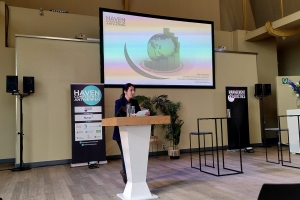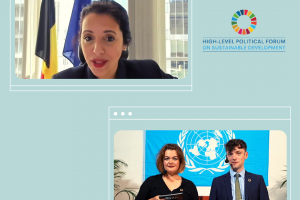Berlin Forum on Chemicals and Sustainability : Ambition and Action Towards 2030

La ministre est intervenue au « Berlin Forum on Chemicals and Sustainability : Ambition and Action Towards 2030 ». Abordant la gestion mondiale des produits chimiques, cet événement international de haut niveau a pour but de positionner la politique sur l’importance et la pertinence d’une gestion raisonnée afin d’atteindre les objectifs du développement durable d’ici à 2030.
L’objectif étant d’inscrire notre pays dans une vision globale et durable de la politique des produits chimiques.
En parallèle, les travaux continuent avec la rencontre CIMES de ce jeudi 8 juillet entre ministres de l’Environnement et de la Santé. Il est essentiel de prendre des actions, des engagements à tous les niveaux de pouvoir afin de garantir le plus haut niveau de protection pour la santé humaine et environnementale.
Intervention de la ministre Khattabi :
First of all, I would like to thank you, Svenja, for your invitation to participate in this dialogue.
Indeed, we must seize the opportunity arising from this sanitary crisis to shape a toxic-free environment.
We should therefore promote a green, safe and sustainable chemistry to ensure that throughout their life- cycle, chemicals do not have a negative impact on human, animal, and environmental health.
In order to achieve a toxic-free environment, we must ensure a safe and clean circular economy. This implies hazardous chemicals to be eliminated or limited only to essential vital uses, until safe and sustainable alternative are developed. The precautionary principle should be applied stringently to groups of chemicals, not only for the purpose of human health in the short and long term but also for environmental sustainability. More than ever, the transversal One World One Health vision should prevail.
A sustainable chemicals management also implies that chemical products are safe and sustainable by design. In this regards, I support the #Design4REACH.
I would like to mention that even if the foreseen post-2020 framework on the sound management of chemicals and waste would not become legally binding, it is important that its implementation as well as the Multilateral Environmental Agreements, becomes a national priority.
I therefore contribute morally and financially to the UNEP Special Programme to assist the beneficiary countries in strengthening their institutional capacity. I would also like to stress that capacity building is a long-term effort that requires the sustainability of this Programme.
Aware of the limitations of international agreements, I will stand for all the actions ensuring that hazardous chemicals banned from the European market [to protect human health and/or the environment] are also no longer produced for the purpose of export; I will contribute to the prevention of double standards in product-related legislations ; and I will support the establishment of a Global Alliance for the phasing out of highly hazardous pesticides and the development of alternative agricultural systems.
Thank you all for your attention and thank you again Svenja for this incredible opportunity. I'll give the floor back to you.


